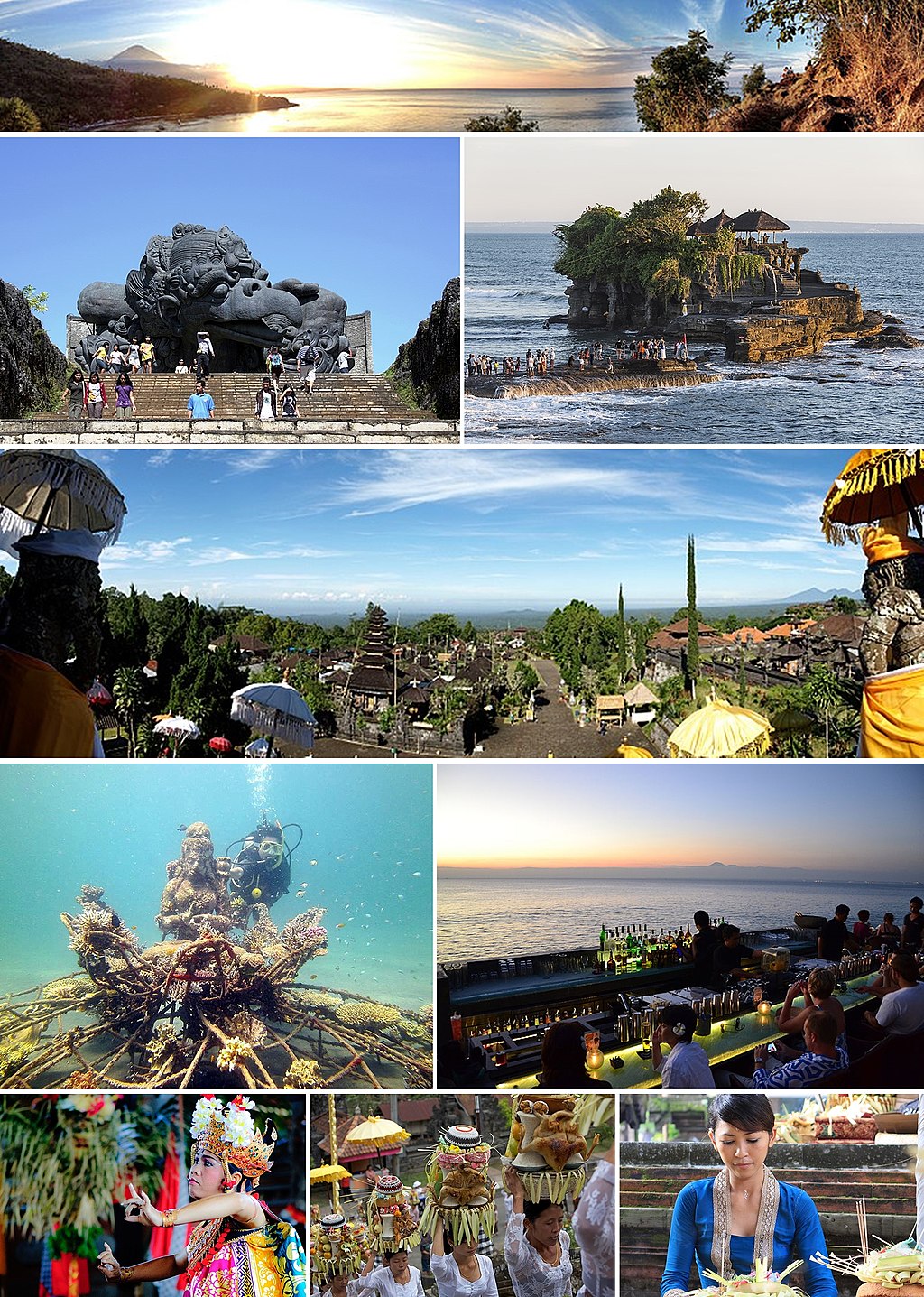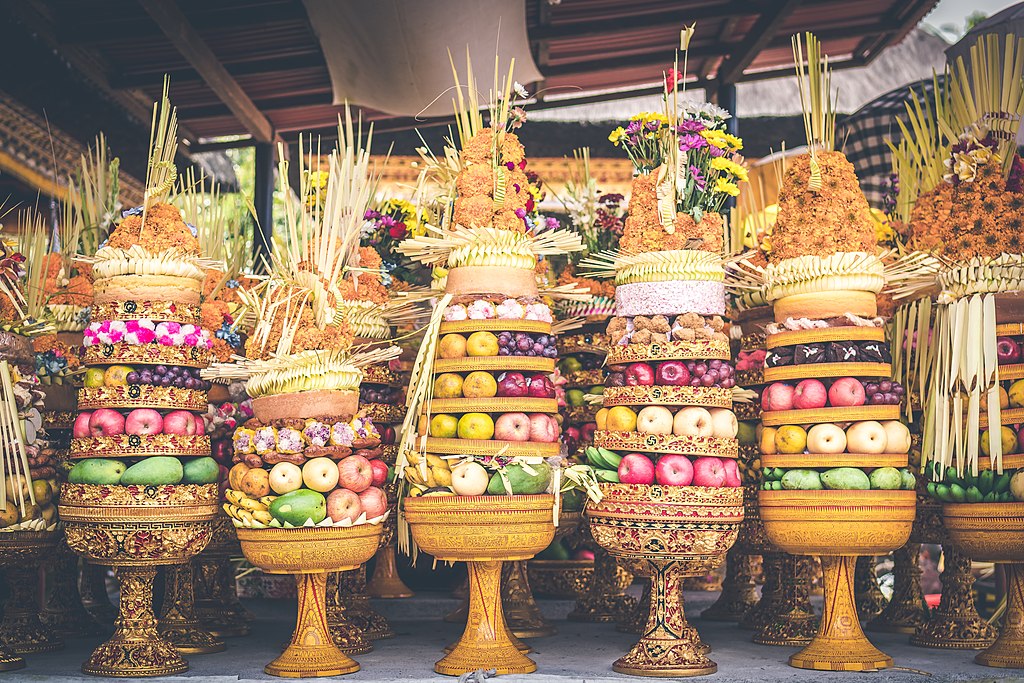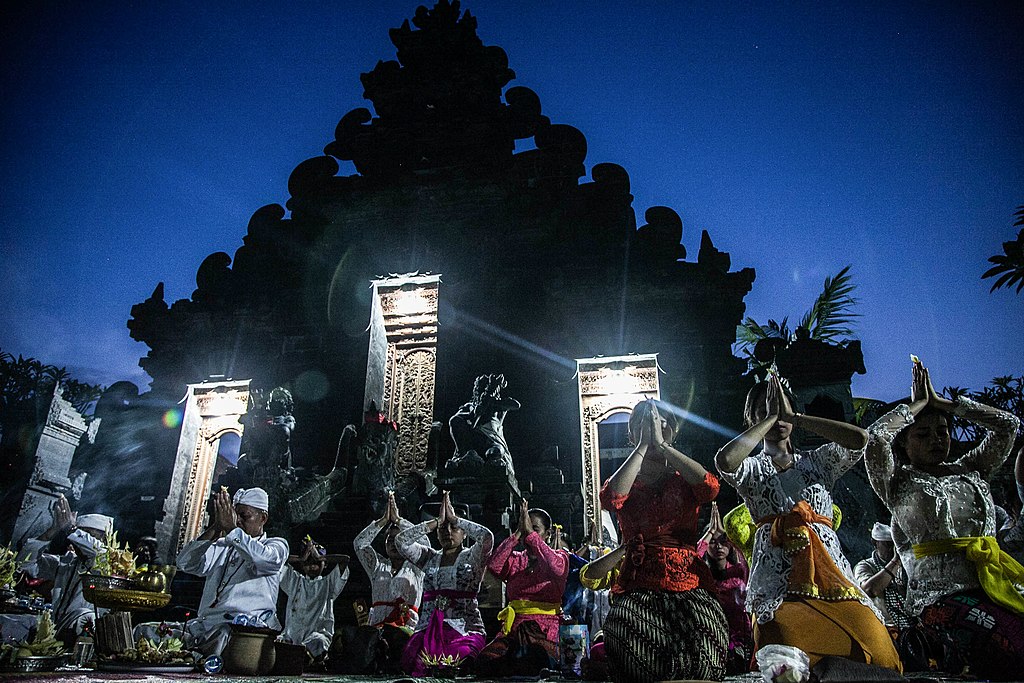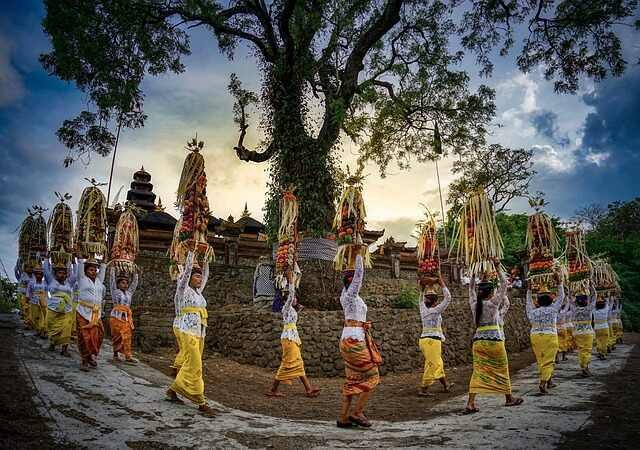Bali and Religions
Seen from Bali, an island with a large majority of Hindu faith, Indonesia is not primarily this Indonesian large Muslim country that we talk about so readily: in the eyes of the Balinese, their island is small, very small, and they rather feel surrounded by a new form of colonizers, even locked up in the heart of an open-air tropical paradise. Religion in Bali occupies a considerable place in the daily life of the Balinese. Every day there are many celebrations that tourists can attend. These are more important in large cities, especially on full moon evenings. Small villages prefer more authentic and intimate celebrations.
From their Hindu religion, the Balinese believe in spirits and reincarnation. Their belief is that the dog is the worst possible reincarnation and the Balinese then most often adopt indifference for these animals.
There are a few Balinese communities that have retained pre-Hindu traditions. They are called Bali Aga. The two best known are the village of Tenganan, in the kabupaten of Karangasem, and that of Trunyan on the shores of Lake Batur.
The traditional religion of other Balinese is called Agama Tirta (“water religion”).
Balinese culture is characterized by elaborate ceremonies and rituals, including the Galungan festival, which celebrates the victory of good over evil, and the Nyepi Day of Silence. All these sacred rituals of daily life help the Balinese to achieve wholeness and spiritual happiness, harmony and peace. You cannot separate art and religion in Bali.
Reputation
The majority of Balinese people practice a unique form of Hinduism, which combines elements of Hinduism, Buddhism, and animism.
This reputation, which makes the island what it is today and what it has become in history, is held by the inhabitants. Their precious living together strongly depends on it and they do their best to respond positively to this image of authenticity.
Visitors clearly see in it the mark of the well-being and spirituality specific, according to them, to Bali, to its inhabitants and to their gods. This is also what they came here to look for when they came from so far away! It remains that in these places, paradisiacal or demonic, beliefs coexist harmoniously, Hinduism itself is indeed crossbred, mixed, infused with animist, Buddhist or shamanic elements. A very seductive sacred cocktail for the traveler!

Sunset over Amed beach with Mount Agung in the background, Garuda Wisnu Kencana monument, Tanah Lot temple, view from top of Besakih Temple, scuba diving around Pemuteran, The Rock Bar at Jimbaran Bay, and various traditional Balinese people activities. File:Amed banner sunset.jpg: borntosleepFile:GarudaWisnuKencana head.jpg: SankoFile:Tanah-Lot Bali Indonesia Pura-Tanah-Lot-01.jpg: CccefalonPanorama of Bali from Besakih – Mother temple.jpg: PopaneshFile:Snorkeling Pemuteran Bali 2.jpg: Ennio morriconeFile:The Rock Bar Bali (7188376333).jpg: Simon_seesFile:Balinese Dancer (Imagicity 1248).jpg: Graham CrumpFile:Balinese vrouwen in een processie bij een festival in Ubud, -7 Aug. 2009 a.jpg: Jean-Marie HullotFile:Balinese girl with offering.jpg: John Yavuz Canderivative work: Badpuccini, CC BY-SA 3.0, via Wikimedia Commons
Religion in Bali
Bali is the only island in the archipelago where Hinduism is the main belief with its ceremonies and festivals specific to the Balinese tradition. 80% of Balinese are Hindus. This religion is particular because it is associated with Buddhist rites and animist cults dedicated to deities. Do not miss Galungan, a huge 3-day festival dedicated to the celebration of gods and ancestors. You will also find the famous Tanah Lot, a Hindu temple erected on a rock, offering an incredible view of one of the most magnificent sunsets in the archipelago.
Balinese Buddhists are a minority and are found in Denpasar and Singaraja. Small Catholic communities are concentrated in the west of the island. Balinese Christians practice their religion fervently. You will be able to attend the very beautiful Sunday masses given by the cathedral of Denpasar with its remarkable architecture with its red stone walls and its immaculate white interior.
Beliefs and religions in Bali
The Balinese population is mainly Hindu, but there is still the presence of other religious communities on the island. These include Christians, Muslims and Buddhists. The life of the inhabitants, particularly the Hindus, is punctuated by ceremonies, rites and festivals of all kinds. With this cohabitation of several religions, it is not surprising that Bali is nicknamed “the island of the gods”.
Hinduism
It is the dominant religion on the island. We find in Balinese Hinduism the same gods venerated by Indian Hinduism, namely Brahma, Shiva and Vishnu, with a fourth superior deity named Sang Hyang Widi whom the faithful adore.
The importance of water in Balinese Hinduism
For the Balinese, water is the source of prosperity and that is why it is used regularly in ceremonies. You should know that the water is known by several names by the faithful Hindus. On a daily basis, it is called “yeh”. When we speak of holy water, we say “tirta” and finally to designate the water which has supernatural powers, that is to say which has the capacity to cure a seriously ill person (in the terminal phase), that this is called “bitterness”.
The offerings
Not a day goes by in Bali without Hindu worshipers making offerings to the gods. Whether directly in a temple or at home, the Balinese always carry out offerings, processions and ceremonies.

Traditional balinese offerings to Gods with fruits in basket. Bali island, village ceremony. Artem Beliaikin from Moscow, Russia, CC0, via Wikimedia Commons
Hindu Gods and Goddesses in Bali | A Guide to the Most Important Deities
Christianity in Bali
The majority of Christians on the island are Catholics. They are mainly grouped in the west of Bali, especially in the village of Palasari. It should be noted, however, that the particular church diocese of the Catholic Church is based in Denpasar, the Balinese capital.
Buddhism
Bali’s Buddhist community is a minority. Moreover, there is only one Buddhist monastery Bharma Asrama Vihara on the spot. It is that of Banjar which is located in the north of the island. This place is still little known to tourists, and you can attend vipassana sessions during your stay on the island. Local monks can teach you how to master breath-based meditation. Access to the site is free, but you can make small donations.
Islam
This religion is practiced by the majority of Indonesians, except on the island of Bali where it has a small minority. In the village of Pegayaman, for example, a large part of the inhabitants are Muslims and the rest are Hindus. Despite the fact that these people each follow their own religion, they have always known how to live in perfect harmony, and this for several decades.
Even during the celebration of religious festivals, whether Muslim or Hindu, unity and brotherhood have been preserved within this small village in the Kabupaten of Buleleng. Indeed, Hindus offer food to their Muslim neighbor and vice versa. This is an old tradition called “ngejot”. Since it is about giving food, people are obviously careful to respect the food taboos of their spiritual neighbor.
Religions in Lombok
The Sasak community, settled in Lombok, is mainly Muslim. It is in the capital, in Mataram, that you will find the largest mosque Masjid Islamic Center as well as the Al Mujahidin, another mosque known for its flamboyant turquoise color. On this island, you will discover many Muslim places of worship with Arabian Nights decor. The prayer is done every Friday at noon.
Some shops, monuments and official sites may be closed for the rest of the day. Eid el-Adha, a major event taking place 70 days after the end of Ramadan, celebrates the sacrifice of the sheep.
As for Christians, they are few in Lombok and go to Sunday mass. Lombok also inherits a local animism, called Wetu Telu, only present in the north of the island. This religion combines the practices of Islam and ancestral animist rites. Indeed, this community has its own cults in parallel with traditional Muslim rites. The Nyiu, one of the Wetu Telu ceremonies, is a celebration where the Sasak make offerings 1000 days after the death of a loved one to allow the deceased to be happy.
In addition, know that on the island of Lombok, slugs are revered, embody abundance and love and are the subject of festivities.
Gods, demons, cursed places, sacred mountains nourish the daily life of the inhabitants. As you will have understood, the border between spirituality and witchcraft is very thin. Thus, we recommend that you visit the island with a great open mind in order to be able to collect the myths and legends that are told there and to awaken your imagination…
Read also: From Bali to Lombok | Complete guide to visit Lombok Island
Balinese religious festival and public holidays
Like religious ceremonies, holidays are particularly numerous in Bali. It is almost possible to party all year round.
These festivals are based on the Balinese lunar calendar and do not follow a fixed order year after year.
Like religious ceremonies, holidays are particularly numerous in Bali. It is almost possible to party all year round.
These festivals are based on the Balinese lunar calendar and do not follow a fixed order year after year.
3 main festivals are particularly important in Bali:
Galungan
This 3-day festival occurs every 210 days and represents the victory of good Dharma over evil Adharma, the creation of the universe. On this occasion, the Balinese return to their village of origin to honor the gods who would descend to the temples.
Kuningan
Celebrated 10 days after Galungan, it honors purification. On this day the ancestors leave the family temple.
Kuningan partially immobilizes the country: service in hotels is reduced and most banks and restaurants are closed. The Balinese believe that the gods and the souls of the ancestors descend to the temples. Bali then comes alive to give rise to countless ceremonies and the festivities culminate ten days later for Kuningan.
Nyepi
Nyepi means silence and celebrates the Hindu New Year. The day before, the Balinese lure evil spirits with offerings and then terrorize them at night with a din of firecrackers, shouts and other gongs, all complemented by a parade of giant monsters in the streets of the city.
The next day, the island becomes completely silent and the inhabitants are asked to stay at home. No noise is tolerated in the streets and no one should be outside. Apart from ambulances, all motorized devices are prohibited from circulation. This obligatory silence will scare away the evil spirits who will think that the island is devoid of its population.

Nyepi Meditation. Hindu worshipers offer a prayer known as “Catur Bratha” which represents self-control to celebrate Nyepi, the annual day of silence that marks the Balinese Hindu new year, at Pura Agung Raksa Bhuana, in Medan on March 6, 2019. Most Balinese practice self-reflection and stay at home to celebrate the quiet holiday by meditating to cleanse and purify the soul. Albert Ivan Damanik, CC BY-SA 4.0, via Wikimedia Commons
Other festivals are particularly important in Bali:
Melasti
Melasti takes place a few days before Nyepi. It is a great purification. The eve of Nyepi is marked by abundant offerings placed at the main crossroads to appease the evil powers and ends, at the end of the day and throughout the evening, with popular parades. The ogoh ogoh (paper mache monsters, folk statues of demons) parading through the streets represent the negative forces of the past year. Cymbals and firecrackers accompany the parade to frighten the demons in a great cacophony. At the end of the night or in the days that follow, these statues are burned to definitively evacuate the negative forces.
The Balinese also purify their objects of worship during a procession to the sacred springs or to the sea.

Ritual of Melasti in Bali. The Melasti ritual is usually carried out to welcome the Nyepi day in Bali. This ritual is carried out in water centers such as lakes, springs and beaches. Imadedana, CC BY-SA 4.0, via Wikimedia Commons
Odalan
Every 210 days (one year according to the Pawukon calendar), the whole village comes together to commemorate the founding of the temple (the odalan). It is then the occasion to pay homage to the divinities by offerings and prayers. With more than 20,000 temples in Bali, the opportunities to attend a ceremony are very numerous!
Odalan celebrates family temples in Balinese villages. It is especially celebrated in the Hindu communities of the island. The Balinese invite their Gods to visit them for three days or more by bringing offerings to the temples.
Read also: Useful Tips for Visiting Temples in Bali
It is to the celebrations of Odalan that we owe a large part of the artistic richness of the island; such as theater and Balinese dances.
Odalan is celebrated on the anniversary of a Hindu temple. For example, Odalan at the Pura Besakih temple – the largest Hindu temple in Bali – is an exceptional event in terms of its size and the number of devotees who prepare and honor it.
Odalan temple anniversaty procession. Balinese women dressed in traditional costume on their way to the temple. Midori, CC BY 3.0, via Wikimedia Commons
Saraswati
Festival dedicated to the goddess of knowledge. The Balinese pay homage to books by sprinkling sacred water. It is celebrated mainly by children, who pray and bring offerings to the school temple. The Balinese also pay homage to the goddess and to the books by sprinkling holy water.
This festival means a lot to the Balinese, especially the students. It always falls on a Saturday. The days following the Saraswati festival are also important.
Pagerwesi
This day is dedicated to spiritual strengthening, called Iron Gate, prayers and offerings are directed to save mankind.
Pagerwesi is a day of spiritual conversion, prayer to overcome the forces of evil, and offerings for humanity in peril. The faithful make offerings to ward off evil and for the deceased. For their part, the children pray and bring offerings to the school temples.
Tumpek
This celebration is dedicated to strengthening the spirit and serves to guard against the forces of evil.
Every 35 days the Balinese make offerings to different elements, objects, people, animals…
- Tumpek Kandang: offerings for animals especially cattle
- Tumpek Wayang: offerings for puppets and shadows
- Tumpek Landep: homage to metal objects (knives, cars, televisions, etc.)
- Tumpek uduh: blessing in thanks for good harvests
- Tumpek Krulut: dedicated to all musical instruments, shows, or masks
World Kite Festival
Between the Hindu religion, the tradition and the belief of the Balinese, the kite would be one of the favorite sports of the gods.
Particularly from June to September, the windy season in Bali, the practice of “layang-layang” kite is not only a game for children but also a whole competition between villages for adults.
In July and August, the world festival takes place where huge kites can reach a wingspan of 5m.
Layang Be bean: reproducing a fish whose fins flutter in the wind
Layang Janggan: looks like a bird or dragon
Layang Pecukan: free creation but rarer because deemed difficult to steal
Read also: Bali Arts Festival in Denpasar | The Biggest Annual Cultural Event in Bali
Non-religious holidays in Bali
There are also other non-religious festivals on Bali. August 17th Indonesian Independence Day.
Schools organize competitions. Middle schoolers must show off their walking skills. You can see them training along the roads.
In July and October the buffalo races in Negara.

One of ceremony procession at the Temple in Bali Perform a Rejang Dewa Dance. Puri Lumbung Cottages, CC BY-SA 4.0, via Wikimedia Commons
Photo credit (main picture): AgungAtmaja via Pixabay


